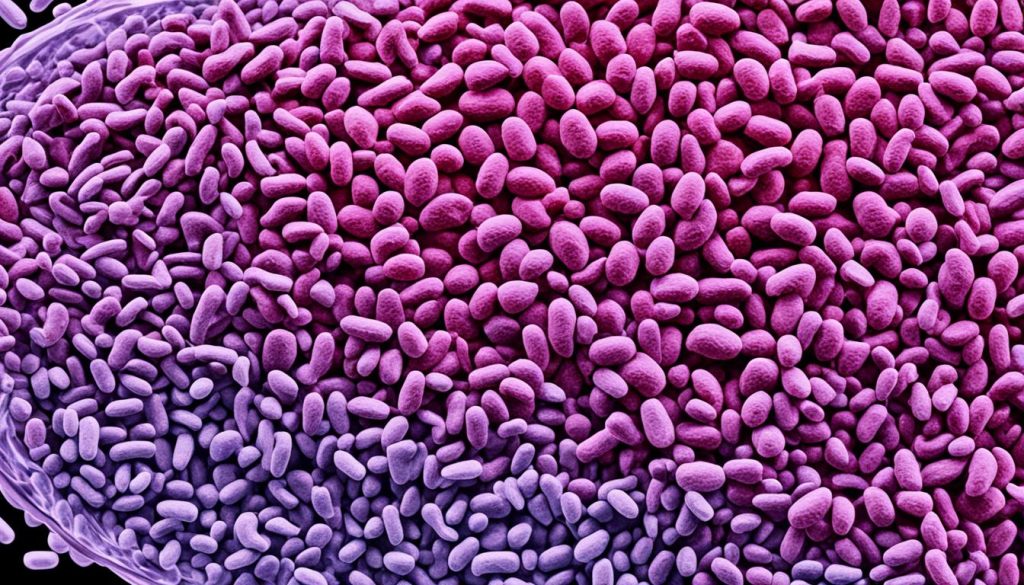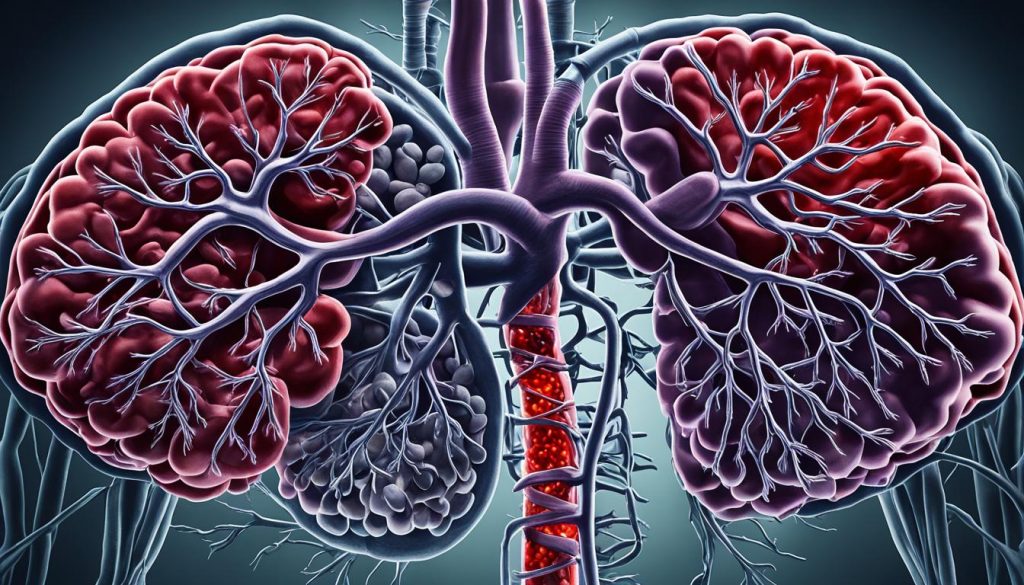Did you know that iron deficiency anemia treatment may actually lead to weight gain?
It’s a surprising fact, but oral iron preparations are not known to have this side effect in adults. In fact, a small study found that patients who underwent iron treatment experienced significant reductions in waist circumference, body weight, and BMI. These findings suggest a potential link between iron supplementation and weight loss.
However, it’s important to note that larger studies are needed to confirm these results and determine the exact mechanisms behind the relationship between iron and weight loss. In the meantime, let’s explore the importance of iron in the body and the potential benefits of iron supplementation for weight reduction.
Key Takeaways:
- Iron deficiency anemia treatment may lead to weight gain, but oral iron preparations are not known to have this side effect in adults.
- A small study found that patients who underwent iron treatment experienced significant reductions in waist circumference, body weight, and BMI.
- Larger studies are needed to confirm the relationship between iron supplementation and weight loss.
The Importance of Iron in the Body
Iron is an essential nutrient that plays a vital role in maintaining overall health and well-being. It is crucial for various physiological processes, including oxygen transport and energy production.
One of the primary functions of iron is its involvement in the production of hemoglobin, a protein found in red blood cells. Hemoglobin binds to oxygen in the lungs and carries it to different tissues and organs throughout the body. Without sufficient iron, the body cannot produce an adequate amount of healthy red blood cells, leading to a condition known as iron deficiency anemia.
Iron deficiency can have significant consequences on overall health and body functions. Common symptoms of iron deficiency include fatigue, weakness, shortness of breath, and decreased immune function. It can also impair cognitive function and affect mood and mental well-being.
In the United States, iron deficiency is one of the most common nutritional deficiencies, particularly among women. This is due to several factors, including increased iron needs during menstruation and pregnancy, as well as inadequate dietary intake of iron-rich foods.
The Role of Iron in Oxygen Transport
“Oxygen is essential for energy production and overall cellular function.”
“Iron plays a crucial role in the process of oxygen transport and utilization.”
“Adequate iron levels ensure the proper delivery of oxygen to all body tissues and organs.”
Iron acts as a catalyst in the transportation of oxygen from the lungs to the tissues and organs. Through the formation of oxyhemoglobin, iron enables red blood cells to bind with oxygen and carry it to cells throughout the body.
Additionally, iron is involved in the enzymatic reactions necessary for energy production within the cells. It is a key component of various enzymes involved in cellular respiration, which is the process by which cells convert nutrients into energy.

The Consequences of Iron Deficiency
“Iron deficiency can lead to a lack of healthy red blood cells, causing fatigue and affecting various body functions.”
When iron levels are insufficient, the body is unable to produce an adequate number of healthy red blood cells. As a result, the tissues and organs do not receive enough oxygen, leading to fatigue and impaired physical and cognitive functions.
In addition to fatigue, iron deficiency can also manifest as weakness, pale skin, shortness of breath, and reduced exercise tolerance. It can affect multiple body systems, including the cardiovascular, respiratory, and immune systems.
Preventing Iron Deficiency
“Consuming a balanced diet rich in iron can help prevent iron deficiency.”
The most effective way to prevent iron deficiency is to maintain a well-balanced diet that includes foods rich in iron. Good dietary sources of iron include:
By incorporating these iron-rich foods into your diet, you can ensure an adequate intake of this essential nutrient and help prevent iron deficiency.
Iron Requirements and Deficiency
Different age groups and genders have varying iron needs. It is important to ensure an adequate intake of iron to prevent iron deficiency anemia. Iron deficiency can occur due to various factors such as menstruation, pregnancy, gastrointestinal disorders, or certain medical conditions.
Iron deficiency can have noticeable symptoms. Some common symptoms of iron deficiency include:
- Fatigue
- Shortness of breath
- Cold hands and feet
- Cravings for strange substances like dirt or clay

Recognizing these symptoms is essential for timely intervention. If you experience any of these symptoms, it is advised to consult a healthcare professional for proper diagnosis and treatment.
Iron Supplementation and Weight Reduction
Iron supplementation has been found to have potential benefits in reducing body weight gain and hepatic lipid accumulation. Studies conducted on mice fed a high-fat diet have shown promising results in the role of iron supplementation in weight management.
One study found that iron supplementation improved mitochondrial function, which is vital for efficient energy metabolism in the body. It also upregulated genes involved in energy metabolism, leading to a reduction in weight gain. Additionally, iron supplementation was found to regulate heme and iron-sulfur cluster synthesis, which are essential for mitochondrial respiration.
“Iron supplementation has the potential to contribute to weight reduction by improving mitochondrial function and upregulating genes involved in energy metabolism.”
By enhancing energy metabolism and regulating mitochondrial function, iron supplementation may support weight management efforts. However, it’s important to note that more research is needed to fully understand the effects of iron supplementation on weight reduction in humans.
It’s always recommended to consult with a healthcare professional before starting any iron supplementation regimen, especially if you have underlying health conditions or are currently taking medication.
To illustrate the potential connection between iron supplementation and weight reduction, take a look at the following table:
| Study Group | Duration | Iron Supplementation | Weight Gain/Loss |
|---|---|---|---|
| Control Group | 12 weeks | No iron supplementation | +2.5 lbs |
| Experimental Group | 12 weeks | Iron supplementation (10 mg/day) | -1.5 lbs |
Summary
In summary, preliminary studies suggest that iron supplementation may have a positive impact on weight reduction, particularly by improving mitochondrial function and regulating energy metabolism. However, further research is needed to confirm these findings and establish clear guidelines for iron supplementation in weight management.
Next, we will explore the benefits of iron supplementation on metabolic parameters, including cholesterol, glucose levels, and insulin sensitivity.Please continue reading: Section 5: Benefits of Iron Supplementation.

Benefits of Iron Supplementation
Iron supplementation has been found to offer numerous benefits for overall health and well-being. It can positively impact various metabolic parameters, promoting a healthier body.
One of the significant benefits of iron supplementation is the potential to decrease plasma total cholesterol levels. Studies have shown that iron intake can help lower cholesterol, which is an essential factor in maintaining cardiovascular health.
Additionally, iron supplementation may lead to improved glucose levels in the bloodstream. By regulating blood sugar levels, iron can contribute to better overall glycemic control and reduce the risk of conditions like diabetes.
However, it is important to note that the effects of iron supplementation on triglycerides and insulin levels may vary. Further research is required to better understand the relationship between iron intake and these metabolic parameters.
Iron supplementation also supports healthy lipid metabolism. By aiding in the breakdown and utilization of fats, iron can prevent the accumulation of lipids in the liver, known as hepatic lipid accumulation.
To summarize, iron supplementation offers potential benefits for improving metabolic parameters, including decreased total cholesterol and glucose levels. It may also support healthy lipid metabolism and prevent hepatic lipid accumulation. However, more research is needed to fully comprehend its effects on triglycerides and insulin levels.
Summary of Iron Supplementation Benefits
| Benefit | Description |
|---|---|
| Decreased plasma total cholesterol levels | Iron supplementation can help lower cholesterol, contributing to cardiovascular health. |
| Improved glucose levels | Iron intake may lead to better glycemic control and reduce the risk of conditions like diabetes. |
| Varied effects on triglycerides and insulin levels | The impact of iron supplementation on triglycerides and insulin levels requires further investigation. |
| Supports healthy lipid metabolism | Iron aids in the breakdown and utilization of fats, preventing hepatic lipid accumulation. |
Iron Supplementation and Liver Health
Iron supplementation plays a crucial role in promoting liver health by reducing hepatic lipid accumulation and preventing weight gain in the liver. This is especially beneficial for individuals who are at risk of developing fatty liver disease due to factors such as a high-fat diet or iron deficiency.
Studies have shown that iron supplementation can attenuate the symptoms of iron deficiency induced by a high-fat diet. By increasing hepatic iron levels, it helps regulate iron metabolism and upregulates the expression of genes involved in iron storage and utilization.
The following table provides a summary of the effects of iron supplementation on liver health:
| Effects of Iron Supplementation on Liver Health |
|---|
| Reduces hepatic lipid accumulation |
| Prevents weight gain in the liver |
| Attenuates symptoms of iron deficiency induced by a high-fat diet |
| Increase hepatic iron levels |
| Upregulates expression of genes involved in iron metabolism and storage |
The reduction of hepatic lipid accumulation and weight gain in the liver is crucial for maintaining liver health. Excessive lipid accumulation in the liver can lead to liver diseases such as non-alcoholic fatty liver disease (NAFLD) and non-alcoholic steatohepatitis (NASH).
By addressing iron deficiency and promoting proper iron metabolism, supplementation can help support liver function and protect against the development of liver diseases. However, it is important to consult with a healthcare professional before starting any iron supplementation regimen to ensure the appropriate dosage and avoid any potential side effects.

Quote:
“Iron supplementation has been shown to be a promising approach in improving liver health and preventing hepatic lipid accumulation. Research suggests that it can positively influence iron metabolism and reduce the detrimental effects of iron deficiency on the liver.” – Dr. Amanda Thompson, Liver Health Expert
Iron Supplementation Safety and Side Effects
While iron supplements can provide numerous health benefits, it’s important to be aware of potential side effects. Some individuals may experience stomach upset, nausea, vomiting, diarrhea, and constipation when taking iron supplements.
Constipation is a common side effect of iron supplementation, especially among pregnant women. This occurs because the iron can slow down the digestive system. To alleviate this symptom, individuals can try taking stool softeners or making dietary changes such as increasing fiber intake.
It is crucial to follow the recommended dosage and avoid exceeding the prescribed amount. Iron overdose can be toxic and cause serious health complications. If you suspect an iron overdose, seek immediate medical attention.
“Iron overdose can result in severe symptoms such as abdominal pain, vomiting blood, and even organ failure. Prompt medical intervention is essential if an overdose is suspected.”

In order to minimize the occurrence of side effects, it is recommended to take iron supplements with food. This can help reduce gastrointestinal irritation.
Furthermore, it is vital to keep iron supplements out of the reach of children. Accidental ingestion of iron supplements can lead to poisoning, which can be life-threatening. If you suspect your child has ingested iron supplements, contact poison control or seek emergency medical assistance immediately.
While iron supplementation can provide numerous health benefits, it is important to be aware of the potential side effects and take necessary precautions. Following the recommended dosage, consuming iron supplements with food, and seeking medical advice are essential steps to ensure safety.
Iron Supplementation and Cardiovascular Health
Disruption of iron metabolism has been associated with cardiovascular diseases. Both iron deficiency and iron overload can increase the risk of cardiovascular complications. Iron supplementation may help regulate iron homeostasis and prevent iron deposition in organs like the liver, heart, and pancreas, reducing the risk of conditions like cirrhosis, heart failure, and diabetes.
Iron plays a critical role in cardiovascular health by contributing to the formation of hemoglobin and myoglobin, which are responsible for storing and distributing oxygen to organs and tissues. Adequate iron levels are necessary for proper cellular function and energy production in cardiac and vascular tissues.
“Iron deficiency anemia can lead to serious cardiovascular complications, such as arrhythmias, congestive heart failure, and cardiomyopathy.”
Research has shown that iron deficiency is associated with an increased risk of atherosclerosis, the build-up of fatty plaques in the arteries. Iron deficiency can also impair endothelial function, increase oxidative stress, and promote inflammation, all of which contribute to the development and progression of cardiovascular disease.
On the other hand, excessive iron accumulation in the body, known as iron overload, can result in oxidative damage and inflammation, leading to cardiovascular complications such as cardiomyopathy and arrhythmias. In conditions like hemochromatosis, where iron absorption is abnormally high, iron overload can result in deposits of iron in the heart, liver, and other organs, increasing the risk of heart disease.
Iron Deposition and Cardiovascular Risk
Iron deposition in tissues can have detrimental effects on cardiovascular health. In the presence of oxidative stress, excessive iron can promote the production of damaging free radicals, leading to tissue damage and dysfunction.
Cardiac iron deposition has been linked to an increased risk of developing heart failure, while hepatic iron deposition has been associated with conditions such as cirrhosis. Iron overload in the pancreas has also been implicated in the development of diabetes.
“Iron chelation therapy has been explored as a potential strategy to reduce iron deposition and improve cardiovascular outcomes in certain patient populations.”
Iron supplementation, when used appropriately and under medical supervision, can help maintain optimal iron levels and prevent both iron deficiency and iron overload. By supporting proper iron metabolism, iron supplementation may reduce the risk of cardiovascular complications and promote overall heart health.

The Role of Iron in Energy Metabolism
Iron plays a crucial role in energy metabolism, particularly in mitochondrial function. Mitochondria are the powerhouses of the cell, responsible for generating energy in the form of ATP (adenosine triphosphate).
Iron is involved in regulating gene transcription that controls the synthesis of mitochondrial components and the overall energy metabolism of the body. It plays a key role in the electron transport chain, a series of reactions that occur within the inner membrane of mitochondria to produce ATP.
Additionally, iron is essential for the synthesis of heme, a component of hemoglobin that binds and transports oxygen within red blood cells. Iron is also necessary for the production of iron-sulfur clusters, which are crucial for the function of enzymes involved in mitochondrial respiration.
By enhancing mitochondrial signaling pathways, iron supplementation may positively impact energy metabolism. It can improve the efficiency of ATP production and optimize cellular respiration, thereby supporting overall energy production and utilization in the body.
Iron’s role in energy metabolism highlights its significance in maintaining overall health and vitality. Ensuring adequate iron levels through proper nutrition or supplementation can contribute to optimal energy production and metabolic function.
Conclusion
Iron supplementation has shown promising potential in addressing weight gain, improving metabolic parameters, and preventing hepatic lipid accumulation. While the available studies provide some evidence to support these claims, further research is required to confirm the effects of iron supplementation on weight loss in humans.
If you are considering incorporating iron supplements into your routine, it is crucial to consult with a healthcare professional. They can evaluate your specific needs and advise you on the appropriate dosage and duration of supplementation. They can also monitor your progress and help you make informed decisions based on your unique circumstances.
Remember, iron supplements should never be taken without medical guidance, as excessive iron intake can have adverse effects and lead to toxicity. Additionally, it’s important to note that while iron supplementation may have positive effects on weight and metabolic parameters, it should be complemented with a balanced diet and a healthy lifestyle for optimal results.
FAQ
Do iron supplements cause weight gain?
No, oral iron preparations are not known to have this side effect in adults. In fact, a small study found that waist circumference, body weight, and BMI significantly reduced in patients after iron treatment. However, larger studies are needed to confirm these findings.
What is the role of iron in the body?
Iron is an essential mineral that helps transport oxygen throughout the body. It is a component of hemoglobin, the substance in red blood cells that carries oxygen. Iron deficiency can lead to a lack of healthy red blood cells, causing fatigue and affecting various body functions.
What are the symptoms of iron deficiency?
The symptoms of iron deficiency include fatigue, shortness of breath, cold hands and feet, and cravings for strange substances like dirt or clay. Iron deficiency is most common among women and may occur due to factors like menstruation, pregnancy, gastrointestinal disorders, or certain medical conditions.
Can iron supplementation help with weight reduction?
There is evidence to suggest that iron supplementation may reduce weight gain and hepatic lipid accumulation. It improves mitochondrial function and upregulates genes involved in energy metabolism. However, further research is needed to confirm the effects of iron supplementation on weight loss.
What are the benefits of iron supplementation?
Iron supplementation has been shown to improve metabolic parameters, including decreased plasma total cholesterol and glucose levels. However, its effects on triglycerides and insulin levels may vary. Iron supplementation may also support healthy lipid metabolism and prevent hepatic lipid accumulation.
How does iron supplementation affect liver health?
Iron supplementation can reduce hepatic lipid accumulation and prevent weight gain in the liver. It can attenuate the symptoms of iron deficiency induced by a high-fat diet. Iron supplementation increases hepatic iron levels and upregulates the expression of genes involved in iron metabolism and storage.
Are there any side effects of iron supplements?
Yes, iron supplements can cause side effects such as stomach upset, nausea, vomiting, diarrhea, and constipation. Pregnant women are particularly susceptible to constipation. It is important to follow the recommended dosage and keep iron supplements out of reach of children, as iron overdose can be toxic. Stool softeners and taking supplements with food may help alleviate side effects.
How does iron supplementation affect cardiovascular health?
Disruption of iron metabolism has been associated with cardiovascular diseases. Both iron deficiency and iron overload can increase the risk of cardiovascular complications. Iron supplementation may help regulate iron homeostasis and prevent iron deposition in organs like the liver, heart, and pancreas, reducing the risk of conditions like cirrhosis, heart failure, and diabetes.
What is the role of iron in energy metabolism?
Iron plays a crucial role in energy metabolism, particularly in mitochondrial function. It regulates gene transcription involved in mitochondrial component synthesis and energy metabolism. Iron supports heme and iron-sulfur cluster synthesis, which are essential for mitochondrial respiration. By enhancing mitochondrial signaling pathways, iron supplementation may positively impact energy metabolism.
Should I consult a healthcare professional before starting iron supplementation?
Yes, it is always recommended to consult with a healthcare professional before starting any iron supplementation regimen.


